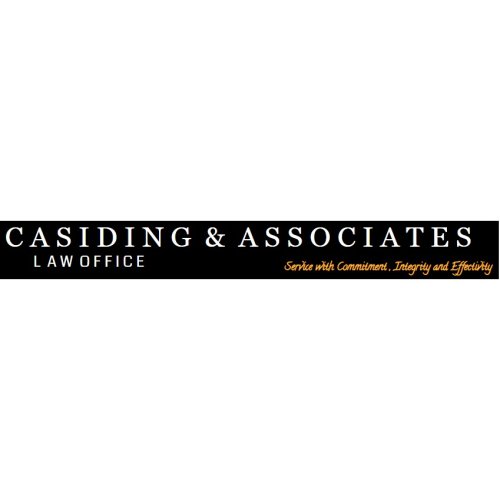Best New Business Formation Lawyers in Philippines
Share your needs with us, get contacted by law firms.
Free. Takes 2 min.
Or refine your search by selecting a city:
List of the best lawyers in Philippines
About New Business Formation Law in Philippines
The process of forming a new business in the Philippines involves several legal and regulatory steps. These include registering your business with the appropriate government entities, acquiring the necessary permits and licenses, and ensuring compliance with local laws and standards. Depending on the structure of your business, you may need to comply with specific requirements set forth by the Securities and Exchange Commission (SEC) or the Department of Trade and Industry (DTI). The choice of a business structure-whether a sole proprietorship, partnership, or corporation-can significantly influence these requirements.
Why You May Need a Lawyer
Legal guidance can be invaluable in several aspects of new business formation. Common scenarios where legal help might be necessary include:
- Navigating the complex registration process to ensure your business is legally recognized and complies with all regulatory requirements.
- Selecting the most beneficial business structure for tax purposes and legal liability.
- Drafting and reviewing important documents such as partnership agreements, articles of incorporation, or lease agreements.
- Advising on intellectual property protection to safeguard business innovations and trademarks.
- Ensuring compliance with labor laws and other regulatory matters that might affect business operations.
Local Laws Overview
Key aspects of local laws relevant to new business formation in the Philippines include:
- Business Registration: Registration with the DTI for sole proprietorships or with the SEC for partnerships and corporations is mandatory.
- Taxation: All businesses must register with the Bureau of Internal Revenue (BIR) and comply with the tax regulations applicable to their business type.
- Labor Laws: Compliance with minimum wage laws, employee benefits, labor standards, and occupational health and safety is crucial.
- Environmental Regulations: Businesses may need to secure environmental compliance certificates depending on their industry and location.
- Licensing and Permits: Local government units require businesses to obtain certain permits like barangay clearance, mayor's permit, and zoning clearance.
Frequently Asked Questions
What are the basic types of business structures in the Philippines?
The basic types include sole proprietorship, general partnership, limited partnership, and corporation.
How long does it take to register a business in the Philippines?
The time can vary, but it generally takes anywhere from a few weeks to a couple of months depending on the type of business and the completeness of document submissions.
What is the minimum capital requirement for a corporation?
For a domestic corporation, the minimum capital stock is typically PHP 5,000. However, there may be higher requirements for certain industries.
Do foreign nationals face restrictions when starting a business in the Philippines?
Yes, there are specific foreign ownership limitations in certain industries, as well as mandatory registrations and permits.
Is it necessary to register with the BIR?
Yes, registration with the BIR is necessary for all businesses to pay appropriate taxes and receive a tax identification number.
What is the procedure to obtain a mayor's permit?
You need to apply for a mayor’s permit at the local city hall or municipal office, providing necessary documents like barangay clearance and occupancy permits.
Can a business be operated from a residential address?
Yes, home-based businesses are possible but may still require clearances from local government units.
What role does the SEC play in business formation?
The SEC is crucial for registering partnerships and corporations and ensures compliance with corporate governance standards.
Are there incentives for starting a business in special economic zones?
Yes, businesses in special economic zones may qualify for tax exemptions and other incentives provided by agencies like PEZA.
How are intellectual property rights handled for new businesses?
The Intellectual Property Office of the Philippines (IPOPHL) governs the registration of patents, trademarks, and copyrights to protect business innovations.
Additional Resources
For further assistance, consider exploring the following resources:
- The Department of Trade and Industry (DTI) for sole proprietorships and general business advice.
- The Securities and Exchange Commission (SEC) for partnerships and corporations.
- The Bureau of Internal Revenue (BIR) for tax-related matters.
- The Philippine Economic Zone Authority (PEZA) for businesses operating in special economic zones.
- The Intellectual Property Office of the Philippines (IPOPHL) for protecting intellectual property.
Next Steps
If you require legal assistance for forming a new business in the Philippines, consider these steps:
- Consult with a business formation lawyer to guide you through the process and help ensure compliance with all relevant laws.
- Prepare all necessary documents based on the type of business structure you choose and the specific industry requirements.
- Consider contacting local government agencies to understand specific regional requirements or potential business incentives.
- Continually stay informed of updates in business regulation to maintain compliance and leverage opportunities for growth.
Lawzana helps you find the best lawyers and law firms in Philippines through a curated and pre-screened list of qualified legal professionals. Our platform offers rankings and detailed profiles of attorneys and law firms, allowing you to compare based on practice areas, including New Business Formation, experience, and client feedback.
Each profile includes a description of the firm's areas of practice, client reviews, team members and partners, year of establishment, spoken languages, office locations, contact information, social media presence, and any published articles or resources. Most firms on our platform speak English and are experienced in both local and international legal matters.
Get a quote from top-rated law firms in Philippines — quickly, securely, and without unnecessary hassle.
Disclaimer:
The information provided on this page is for general informational purposes only and does not constitute legal advice. While we strive to ensure the accuracy and relevance of the content, legal information may change over time, and interpretations of the law can vary. You should always consult with a qualified legal professional for advice specific to your situation.
We disclaim all liability for actions taken or not taken based on the content of this page. If you believe any information is incorrect or outdated, please contact us, and we will review and update it where appropriate.
Browse new business formation law firms by city in Philippines
Refine your search by selecting a city.

















